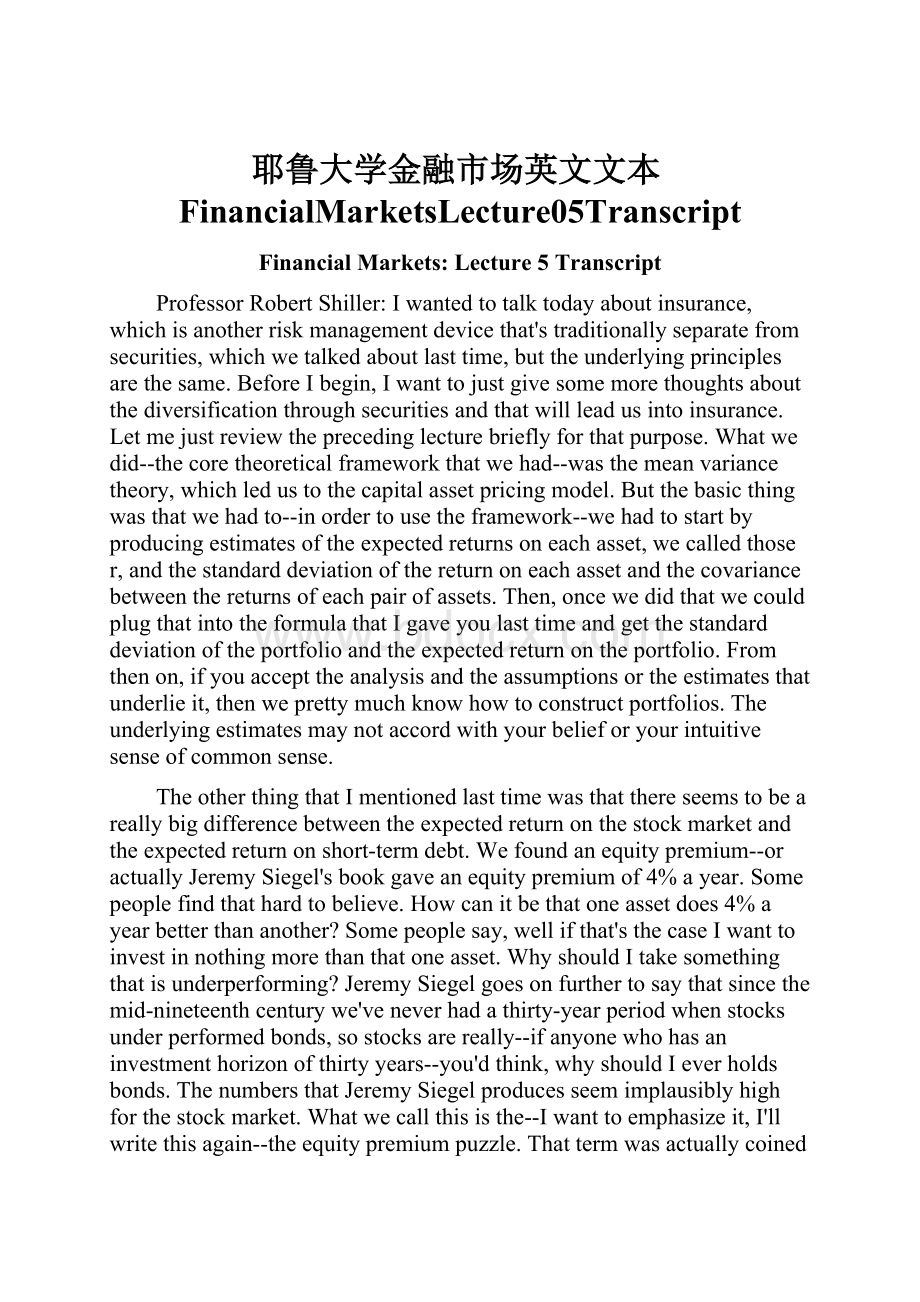耶鲁大学金融市场英文文本FinancialMarketsLecture05Transcript.docx
《耶鲁大学金融市场英文文本FinancialMarketsLecture05Transcript.docx》由会员分享,可在线阅读,更多相关《耶鲁大学金融市场英文文本FinancialMarketsLecture05Transcript.docx(19页珍藏版)》请在冰豆网上搜索。

耶鲁大学金融市场英文文本FinancialMarketsLecture05Transcript
FinancialMarkets:
Lecture5Transcript
ProfessorRobertShiller:
Iwantedtotalktodayaboutinsurance,whichisanotherriskmanagementdevicethat'straditionallyseparatefromsecurities,whichwetalkedaboutlasttime,buttheunderlyingprinciplesarethesame.BeforeIbegin,Iwanttojustgivesomemorethoughtsaboutthediversificationthroughsecuritiesandthatwillleadusintoinsurance.Letmejustreviewtheprecedinglecturebrieflyforthatpurpose.Whatwedid--thecoretheoreticalframeworkthatwehad--wasthemeanvariancetheory,whichledustothecapitalassetpricingmodel.Butthebasicthingwasthatwehadto--inordertousetheframework--wehadtostartbyproducingestimatesoftheexpectedreturnsoneachasset,wecalledthoser,andthestandarddeviationofthereturnoneachassetandthecovariancebetweenthereturnsofeachpairofassets.Then,oncewedidthatwecouldplugthatintotheformulathatIgaveyoulasttimeandgetthestandarddeviationoftheportfolioandtheexpectedreturnontheportfolio.Fromthenon,ifyouaccepttheanalysisandtheassumptionsortheestimatesthatunderlieit,thenweprettymuchknowhowtoconstructportfolios.Theunderlyingestimatesmaynotaccordwithyourbelieforyourintuitivesenseofcommonsense.
TheotherthingthatImentionedlasttimewasthatthereseemstobeareallybigdifferencebetweentheexpectedreturnonthestockmarketandtheexpectedreturnonshort-termdebt.Wefoundanequitypremium--oractuallyJeremySiegel'sbookgaveanequitypremiumof4%ayear.Somepeoplefindthathardtobelieve.Howcanitbethatoneassetdoes4%ayearbetterthananother?
Somepeoplesay,wellifthat'sthecaseIwanttoinvestinnothingmorethanthatoneasset.WhyshouldItakesomethingthatisunderperforming?
JeremySiegelgoesonfurthertosaythatsincethemid-nineteenthcenturywe'veneverhadathirty-yearperiodwhenstocksunderperformedbonds,sostocksarereally--ifanyonewhohasaninvestmenthorizonofthirtyyears--you'dthink,whyshouldIeverholdsbonds.ThenumbersthatJeremySiegelproducesseemimplausiblyhighforthestockmarket.Whatwecallthisisthe--Iwanttoemphasizeit,I'llwritethisagain--theequitypremiumpuzzle.Thattermwasactuallycoinedbyeconomists,PrescottandMehra;it'snowingeneraluse.Thatis,itjustseemsthatstockssomuchoutperformotherinvestments.
ForJeremySiegel,inthelatesteditionofhisbook,theequitypremiumis4%ayearsince1802.That'salmost--nothat'smorethan100--that's206years.Whywouldthatbeandcanyoubelievethat?
Onequestionthatcomesupisthatmaybe--thisisfortheU.S.data--andsomepeoplesay,well,maybe,whyarewelookingattheU.S.?
BecausetheU.S.isanarguablyverysuccessfulcountry,sowehave,potentially,abiasin--it'scalledaselectionbias.Ifyoupickasthecountryyoustudyoneofthemostsuccessfulcountriesintheworld,thatdoesn'tinformyouverywellaboutwhatitisforarandomcountryorfortheU.S.goingforward,there'ssomethingwrong.TheU.S.hasbeensuccessfulinfinancialmarketsandit'sbeingimitatedbylotsofcountries.Financialmarketssimilartooursarebeingsetupinmanyplaces.Youwonder,youknow,maybethey'reoverimitating;maybewewerejustluckyormaybeitwasbecausetheU.S.wasthefirst,insomeways,todevelopsomeofthesefinancialinstitutions--oroneofthefirst.Butnow,whenmoreandmorecountriesstartdoingit,maybeitwon'tworksowell.
Onewayofinvestigatingthisis--togetaroundtheselectionbias--istotrytolookatallcountries.Let'snotjustlookattheUnitedStates;let'slookateverycountryoftheworldandlet'sseeiftheyhaveanequitypremium.There'saproblemwiththatandtheproblemisthatcountriesthatarelesssuccessfuldon'tkeepdata--that'saproblem.Orthey--sometimestheyjustshutdowntheirstockmarketsatsomepoint.Thisissince1802--nowhowmanycountriesdoyouthinkhaveuninterruptedstockmarketdatasince1802?
Whatdoyouthink?
Nameanothercountrythatprobablyhasit.What'sthat?
England,UK?
Ifyougoontothecontinent,though,theytendedtobeinterruptedbyWorldWarIandWorldWarII.WhataboutJapan,dotheyhave--doyouthinktheyhaveuninterrupted?
TheyhadalittlebitofaproblemaroundWorldWarIIandyoucantrytobridgethegap,but--anyway,therearepeoplewhohavetriedtosortthisout.There'sone,it'sabookbyDimson,Marsh,&Stauntonthat--calledTriumphoftheOptimists--thatJeremySiegelquotes.Hehasatableinthenew,fourtheditionofhisbook.
Dimson,MarshandStauntonlookatthefollowingcountries:
Belgium,Italy,Germany,France,Spain,Japan,Switzerland,Ireland,Denmark,Netherlands,UK,Canada,U.S.,SouthAfrica,Australia,andSweden.Everyoneofthemhasapositiveequitypremium;althoughtheU.S.isonthehighsideofthemall,it'snotthebest.Thecountrythathasthehighestequitypremium--andthat'sforthewholetwentiethcentury,theycouldn'tgobackto1802--themostsuccessfulcountryisSwedenandafterthatAustralia.U.S.isnotthemostsuccessfulstockmarketalthoughit'shighonthelist.JeremySiegelconcludesthatthere's--thattheequity--hesaidthatthese--thatthisbookbyDimson,MarshandStauntonputstobedanyconcernsaboutselectionbiasandheclaimsthatsomanycountrieshaveshownanequitypremiumthatwecanbeconfident.Hisbookisreallyverystrongontheconclusions.Thetitleofthebook,StocksfortheLongRun--stocksalwaysoutperformotherinvestmentsforthelongrunandhesaysit'snotduetoselectionbias.
Youknow,Ikindofwonder,thelistofcountriesthatIjustreadtoyou,thatDimson,MarshandStauntonstudied,excludessomeimportantcountries,doesn'tit?
Whodoesitexclude?
Well,itdoesn'thaveIndia,Russia,andChinainit,forexample.AtleastRussiaandChina--doyouknowanythingabouttheirhistory?
Theyhaveanystockmarketdisruptionsinthelastonehundredyears?
That'skindofobvious.Theyhadacommunistrevolutioninbothplaces,right?
RussiaandChinaarenotmentionedby--ornotstudiedbyDimson,MarshandStaunton.Whynot?
Well,theycan'tgetdata,therewasn'tastockmarket.WellthereactuallywasastockmarketinRussiabefore1918andinChinabefore1949,sowhathappenedtoinvestors?
IfyouwereaChineseinvestorinChinesestocksin1949,whathappened?
Weknowwhathappened.Itwent--that'sthatfamousminus100%return,right,whichdominateseverything.
Ithink--whatwouldSiegelsay?
He'sreallysayingthatthisequitypremiumisenduringandweshouldbelieveit.Idon'tknow,Ithinkthat--IthinkwhatJeremywouldsayis,wellyou'relooking--ifyoulookatRussiaandChina,you'relookingatpoliticalfactorsandI'monlylookingatpoliticallystablecountries,sothiswholethingisirrelevant.Really,we'renotgoingtohaveacommunistrevolutioninanyoftheseadvancedcountriesnow.SoJeremywouldsay,forgetthat,itlooksprettysoundthatwehaveanequitypremiumsowecantrustthat.Well,he'sagoodfriendofmine,butIthinkhemaybeoverstatingitalittlebit;wehavesomedisagreements.
Thethingthatcomestomymindisthat--Iwanttosaybeforeconcludingthisreviewofthelastlecture--thatisthatthestockmarketisinherentlypoliticalinanycountry.Politicshavetremendouseffectsonthevaluesinthestockmarketandthat'sbecauseof--evenifthegovernmentdoesn'tnationalizethestockmarketorconfiscateassets,theytaxthem.Doyouknowwehave,intheU.S.,acorporateprofitstax?
Well,it'snotjustintheU.S.,essentiallyevery--Idon'tknowifthere'sanyexception.Theremaynotbeanexception,butessentiallyeverycountryhasacorporateprofitstaxandthenwealsohaveapersonalincometax.Thecorporateprofitstaxgoesaftertheprofitsthatcorporationsmake.Thepersonal--it'stakenfromcorporationsbeforetheypayouttheirdividends.Thepersonalincometaxisleviedonindividualsandtheseindividualshavetopayit.Thepersonalincometaxisnotsimple;it'snotjustaflatrateonyourincome,itdependsonthetypeofincome.Dividendincomeorcapitalgainsincomeinthestockmarketistaxeddifferently.
Theinterestingthingisthatthroughtime,aspoliticalwindschange,thesetaxeshavechangedandthey'vegoneuptosomeveryhighlevelsinthepastintheUnitedStatesandothercountries.I'mgoingtogivesomeU.S.taxrates.Thepersonaltaxondividends--ofcourseitdependsalsoonyourtaxbracketandyourincome;I'mgoingtotalkaboutthehighesttaxbracket.IntheU.S.,itwentover90%inWorldWarIIandthesucceedingyears.Thegovernmentwastaking90%ofyourdividendincome.Whatisittoday?
Doesanyoneknow?
What'sthetaxrateofdividendstoday?
Itmightbezeroforsomepeople,butit'sactually--itis--thestandardrateforpeoplewhohavenotnegligibleincomeis15%.It'sgonedownfromover90%to15%.Whydiditdothat?
Well,it'ssomekindofpoliticalchangeandthecorporate–incidentally,atthebeginningofthetwentiethcenturyyouwereright.Whosaidzero?
Wedidn'tevenhaveincometaxuntil1913whentheSupremeCourtallowedit,soitwaszero,thenitwentupto90%--oractuallyitwas94%atthepeak--anditcamedownto15%.That'saprettybighitonthestockmarket.So,itwasn'tjustChinathattookthestockmarket.Whenweweretaking90%ofdividendsthatwas90%ofthestockmarketbeingtakenbythegovernment;butthat'snotallbecausewewerealsotaxingthecorporations.
Intheearlypost-warperiod,thecorporate--nowI'mgoingtotalk--there'sadistinctionbetweentheratethattheychargeandthea